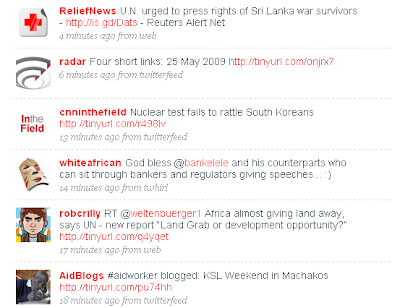 Jon Thompson pointed me to a very interesting social media project at the World Food Programme, CipCip. Here is a brief bit about it.
Jon Thompson pointed me to a very interesting social media project at the World Food Programme, CipCip. Here is a brief bit about it.
The Life of a Project Called “Deliver”: CipCip: It is not what you do, but who you do it with
Long gone are the times where you put a knowledgeable person somewhere and she or he could do the job. Our work has become so complex, time-critical and crucial to saving lives that “collaboration” with others has become a must. Not only with external parties like donors, government counterparts and other NGOs/UN agencies but also internally within the organisation.“Information” is a key part of the collaboration. Accessing and sharing information a must.
And data is everywhere. From corporate servers, to Access databases in field offices, to Excel spreadsheets somewhere on individual computers. There is not one bit of information that exists, which is not in a digital form, apart from the feeling of the sand between your toes on a romantic summer evening.
The data exists. But is hardly made accessible let alone shared.
With the DELIVER project we aim to make the information, essential for moving 4.7 million tons of food annually, available to all those who need it. And more.
One of the key goals of DELIVER is the collection, analysis, storage and dispatch of time critical information, generated by systems, people or by public sources.
This is a cool project and reminds me of some other efforts that are swirling around as people in NGOs/NPOs seek to understand a strategic application of social media. Look at the cool work that Tracker is doing. There is this liberating idea that no one organization or person is the central source of information. They key is capturing useful information into a flow, then use the intelligence of the associated community to pull out key stuff and connections with people who can tell more or act on the ‘stuff.’
We talk about overwhelm. It is reality now. So schemes to swim productively in the overwhelm in a strategic matter should be our focus.
What is your scheme? (Or is that the wrong word?) 😉